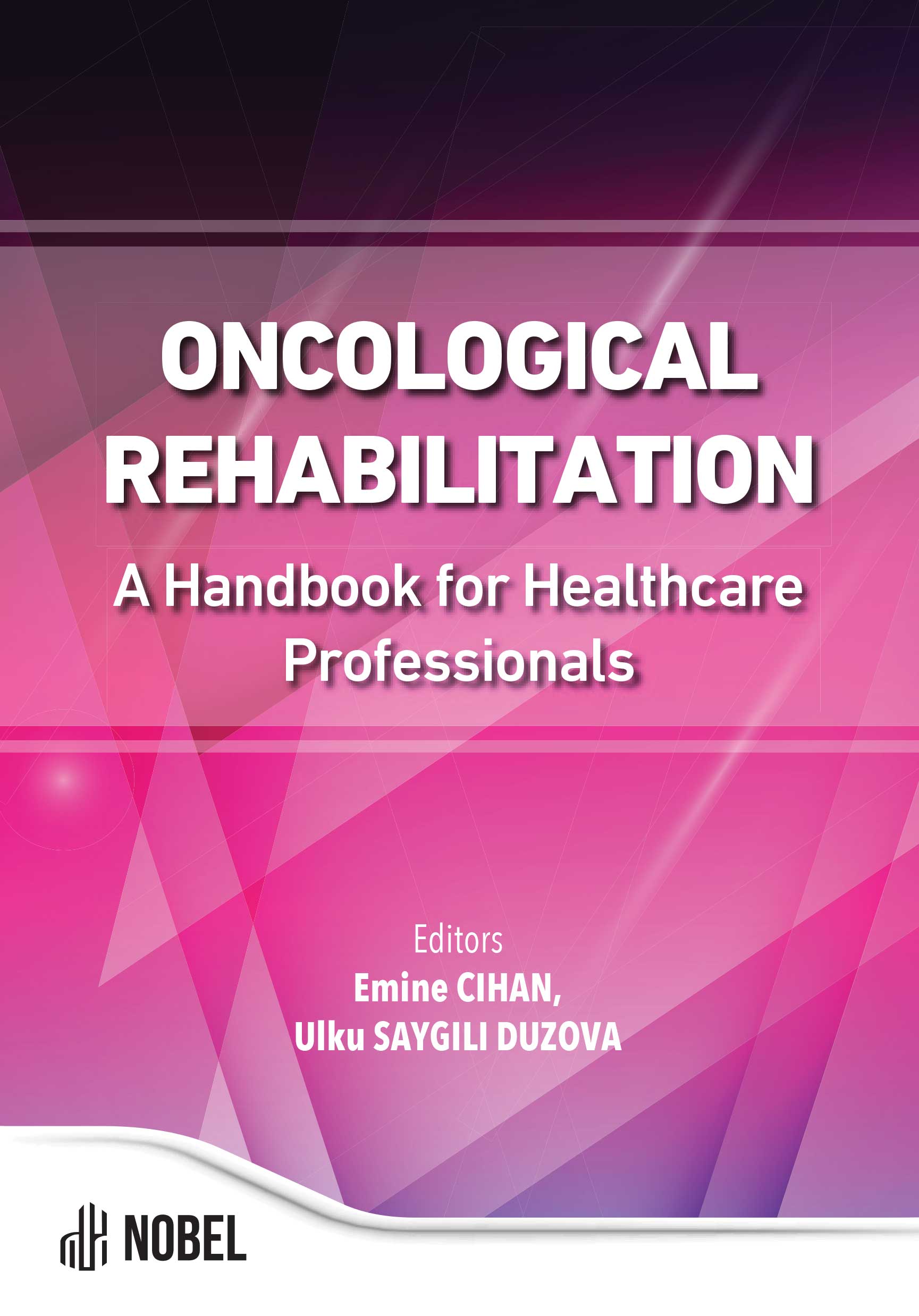Palliative Care in Oncology Patients
Ulku Saygili Duzova (Author)
Release Date: 2024-03-07
Symptom management and palliative care in oncology patients are critical to improving patients’ quality of life. Symptoms such as pain, nausea, fatigue and psychological stress are common during cancer treatment and these symptoms need to be managed effectively. Symptom management may involve a combination of pharmacological and non-pharmacological methods. Palliative care aims not only to [...]
Media Type
PDF
Buy from
Price may vary by retailers
| Work Type | Book Chapter |
|---|---|
| Published in | Oncological Rehabilitation a Handbook for Healthcare Professionals |
| First Page | 125 |
| Last Page | 152 |
| DOI | https://doi.org/10.69860/nobel.9786053358893.6 |
| ISBN | 978-605-335-889-3 (PDF) |
| Language | ENG |
| Page Count | 28 |
| Copyright Holder | Nobel Tıp Kitabevleri |
| License | https://nobelpub.com/publish-with-us/copyright-and-licensing |
Ulku Saygili Duzova (Author)
Selcuk University
https://orcid.org/0000-0001-8402-0022
3Dr Ulku Saygili Duzova graduated from Ankara University in 2008. She completed her master’s degree at Gaziantep University Institute of Health Sciences Department of Internal Medicine Nursing in 2021, her master’s degree at Selçuk University Institute of Health Sciences Department of Physiology in 2018, and her doctorate degree at Istanbul University - Cerrahpaşa Florence Nightingale Faculty of Nursing Department of Internal Medicine Nursing in 2021. has completed.
Between 2008 and 2011, she worked as an active nurse (General surgery, Neurology Intensive Care, Oncology, Chest diseases service nursing) at Ondokuz Mayıs University Faculty of Medicine. In 2011-2013, he worked as a lecturer in Gümüşhane University SHMYO primary aid program. She worked as a lecturer in Selçuk University SHMYO elderly care program between 2011-2022. As of 2022, Selçuk University Faculty of Nursing, Department of Nursing, Department of Internal Medicine Nursing, Dr. Lecturer She serves as a member. The researcher, who wrote his master’s and doctoral theses in the field of oncology, has many studies and book chapters on palliative care in cancer patients.
Bray, F., Laversanne, M., Sung, H., Ferlay, J., Siegel, R. L., Soerjomataram, I., & Jemal, A. (2024).
Özçelik, H., Fadıloğlu, Ç., Uyar, M., & Karabulut, B. (2010). Kanser hastaları ve aileleri için palyatif bakım. İzmir: Üniversite Opse
World Health Organization. (2024). WHO definition of palliative care. Retrieved March 10, 2024, from http://www.who.int/cancer/palliative/en
Kıvanç, M. M. (2017). Türkiye’de palyatif bakım hizmetleri. Sağlık Bilimleri ve Meslekleri Dergisi, 4(2), 132-135.
Uslu, F. Ş., & Terzioğlu, F. (2015). Dünyada ve Türkiye’de palyatif bakim eğitimi ve örgütlenmesi. Cumhuriyet Hemşirelik Dergisi, 4(2), 81-90.
Ataman Kufacı, A., & Mumcu, N. (2022). Palyatif Bakımda Ağrı Yönetimi. ERÜ Sağlık Bilimleri Fakültesi Dergisi, 9(2), 28-36.
Can G. (2018). Kanser Hastasında Kanıta Dayalı Palyatif Bakım – Konsensus 2017, Nobel Tıp Kitapevleri, İstanbul.
Özdaş, T., & Dönmez, E. (2023). Palyatif bakım alan onkoloji hastalarında dispne ve değerlendirilmesi: Dyspnea and its assessment in palliative oncology patients. Journal of 5N1Quality, 1(1), 29-38.
Saygılı, Ü., & Kılıç, S. P. (2021). Gastrointestinal sistem kanserli hastalarda yorgunluk ve yaşam kalitesi. İzmir Katip Çelebi Üniversitesi Sağlık Bilimleri Fakültesi Dergisi, 1(6), 274-282.
Can G. (2015). Onkoloji Hemşireliği. İstanbul, Nobel TıpKitapevi
Saygılı Ü., Bıçak D., Can G., Başıbüyük M., Ghrayeb I., Meron T., Özcan K., Bingöl H., Karabacak Ü., Zadjali M. A. , et al., Konstipasyon, -Kanser Hastasında Kanıta Dayalı Palyatif Bakım – Konsensus 2017-, Gülbeyaz Can, Editör, Nobel Tıp Kitapevleri, İstanbul, ss.87-102, 2018
Uysal, N. Ş., Şenel, G., Karaca, Ş., Kadıoğulları, N., Koçak, N., & Oğuz, G. (2015). Palyatif bakım kliniğinde yatan hastalarda görülen semptomlar ve palyatif bakımın semptom kontrolüne etkisi. Ağrı, 27(2), 104-110.
https://www.palyatifbakim.org.tr/images/klavuzlar/AGRI.pdf
Kim, H. S., Park, D. H., Kim, J. W., Jee, M. G., Baik, S. K., & Kwon, S. O. (2005). Effectiveness of walking exercise as a bowel preparation for colonoscopy: A randomized controlled trial. American Journal of Gastroenterology, 100(9), 1964-1969. https://doi.org/10.1111/j.1572- 0241.2005.50317.x
https://palliativecare.org.au/resource/resources-facts-about-morphine-and-other-opioid-medicines-in-palliative-care/ 10.0
| onix_3.0::thoth | Thoth ONIX 3.0 |
|---|---|
| onix_3.0::project_muse | Project MUSE ONIX 3.0 |
| onix_3.0::oapen | OAPEN ONIX 3.0 |
| onix_3.0::jstor | JSTOR ONIX 3.0 |
| onix_3.0::google_books | Google Books ONIX 3.0 |
| onix_3.0::overdrive | OverDrive ONIX 3.0 |
| onix_2.1::ebsco_host | EBSCO Host ONIX 2.1 |
| csv::thoth | Thoth CSV |
| json::thoth | Thoth JSON |
| kbart::oclc | OCLC KBART |
| bibtex::thoth | Thoth BibTeX |
| doideposit::crossref | CrossRef DOI deposit |
| onix_2.1::proquest_ebrary | ProQuest Ebrary ONIX 2.1 |
| marc21record::thoth | Thoth MARC 21 Record |
| marc21markup::thoth | Thoth MARC 21 Markup |
| marc21xml::thoth | Thoth MARC 21 XML |

